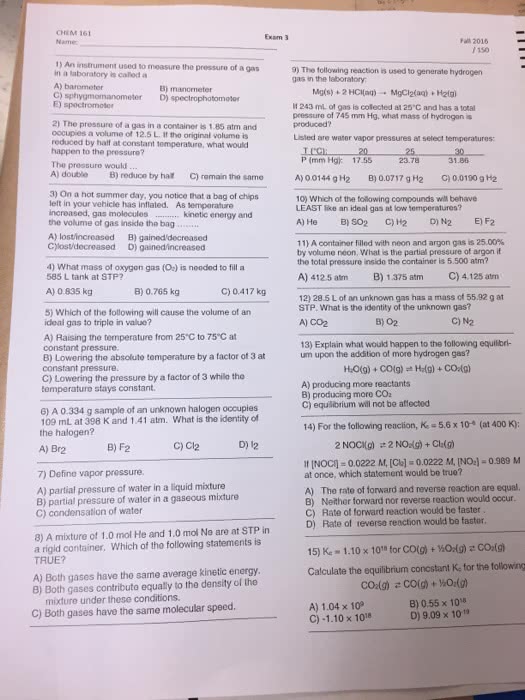CHEM463 Lecture Notes - Kinetic Theory Of Gases, Pneumatic Trough, Partial Pressure
Document Summary
Get access


Related textbook solutions
Chemistry: Structure and Properties
Basic Chemistry
Principles of Chemistry Molecular Approach
Chemistry: Structure and Properties
Principles of Chemistry Molecular Approach
Chemistry: A Molecular Approach
Chemistry: A Molecular Approach
Principles of Chemistry: A Molecular Approach
Chemistry: The Central Science
Related Documents
Related Questions
Question 11 pts
Which general statement about gases is NOT correct?
| The molecules of a pure gas are distributed evenly throughout the container. |
| Gases are much less dense than liquids or solids |
| Molecules in a gas mixture can form layers according to their densities |
| Gases can be compressed, even to the point of liquefaction |
Flag this Question
Question 21 pts
Which example is the greatest pressure?
| 1.00 atm |
| 101 kPa |
| 760 mm Hg (= 760 torr) |
| All of the above pressures are equal. |
Flag this Question
Question 31 pts
Which example is the greatest pressure?
| 850 mm Hg (= 850 torr) |
| 1.5 atm |
| All of the above pressures are equal. |
| 96 kPa |
Flag this Question
Question 41 pts
Assuming all other variables are held constant, a graph of which of the following will NOT yield a straight line?
| P vs. V |
| V vs. T |
| P vs. T |
| V vs. n |
Flag this Question
Question 51 pts
A sealed vessel contains 0.250 mol of oxygen gas. Which of the following will result in a decrease in the pressure of the oxygen gas?
| increasing the number of moles of oxygen |
| increasing the temperature of the vessel |
| increasing the volume of the vessel |
| adding some helium to the vessel |
Flag this Question
Question 61 pts
According to Charlesâs law, which change will cause the pressure of a gas to double? Pressure and amount of gas are constant.
| The temperature decreases from 650 K to 325 K. |
| The temperature of the sample decreases from�88 °C to 44 °C. |
| The temperature of the sample increases from�22 °C to 44 °C. |
| The temperature of the sample increases from�250 K to 500 K. |
Flag this Question
Question 71 pts
Which set of units for P, V, and T can be used for combined gas law calculations?
| torr, L, and Kelvins |
| tm, g/L, and Kelvins |
| atm, mL, and degrees Celsius |
| inches of mercury, g/mL, and degrees Celsius |
Flag this Question
Question 81 pts
The vapor pressure of a gas is
| the atmospheric pressure at which the boiling point is determined. |
| the pressure at a Kelvin temperature exactly two times the boiling point. |
| impossible to determine experimentally without knowing the temperature and volume. |
| the pressure above a gas sample when evaporation and condensation are balanced. |
Flag this Question
Question 91 pts
In a chemistry experiment where CO2 is collected over water, the atmospheric pressure is 755 mm. The partial pressure of water at the temperature in the lab is 24.2 mm. What is the pressure of the CO2?
| 779 mm |
| 731 mm |
| More information is needed to answer this question |
| 755 mm |
Flag this Question
Question 101 pts
Which statement is NOT true according to the kinetic molecular theory of gases?
| Molecules undergo elastic collisions |
| Molecules move in straight-line paths. |
| Molecules of different gases have different�kinetic energies at the same temperature |
| Molecules occupy a negligible volume. |
Flag this Question
Question 111 pts
Which statement is NOT true according to the ideal
gas law?
| At constant P & T, V must increase when n increases. |
| At constant V & T, P must decrease when n decreases. |
| At constant V & n, P must increase when T increases. |
| At constant P & n, V must decrease when T increases |
